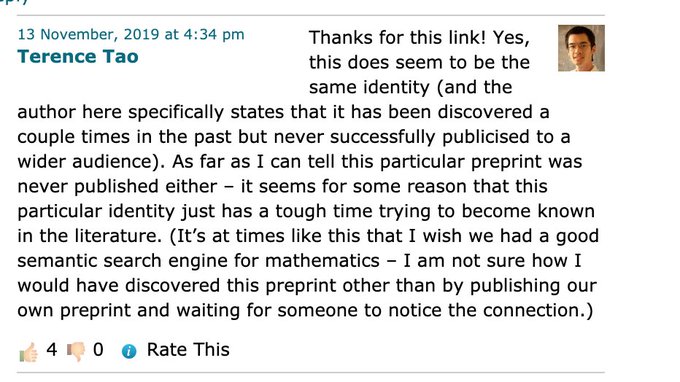Zulip Chat Archive
Stream: maths
Topic: Linear algebra
Sebastien Gouezel (Nov 04 2019 at 22:09):
I need some bits of linear algebra, and I am really struggling. I had forgotten how hard it is to use a part of the library you are not familiar with! Anyway, I am sure everything is already there to get the following statement, but whenever I start with something I begin to unfold and unfold and I am sure I shouldn't (and I guess I am not even writing it in the correct way).
open_locale classical lemma linear_map.pi_apply_eq {ι : Type u} [fintype ι] {𝕜 : Type u} [discrete_field 𝕜] {E : Type v} [add_comm_group E] [vector_space 𝕜 E] (f : (ι → 𝕜) →ₗ[𝕜] E) (x : ι → 𝕜) : f x = finset.sum finset.univ (λi:ι, x i • (f (λj, if j = i then 1 else 0))) := sorry
Between constr_self (pi.is_basis_fun 𝕜 ι) f or linear_map.std_basis, I don't know where to start!
Mario Carneiro (Nov 04 2019 at 22:32):
imports?
Reid Barton (Nov 04 2019 at 22:34):
No, start with a copyright header
Mario Carneiro (Nov 04 2019 at 22:35):
import apache
Reid Barton (Nov 04 2019 at 22:38):
More seriously, I think you should first use linearity of f to reduce to the same statement without f
Reid Barton (Nov 04 2019 at 22:45):
Then I don't know whether it is an existing lemma. It does seem to be std_basis-related somehow. Anyways, it doesn't look very difficult to prove using sum_mul_boole for example
Sebastien Gouezel (Nov 05 2019 at 10:46):
I ended up doing the following, avoiding completely the linear algebra basis framework, which is a little bit sad. I would be very happy to see the proper way to write it, possibly replacing λj, if i = j then 1 else 0 by something more idiomatic. Imports and header included :) Thanks for the reference to sum_mul_boole.
/- Nice Zulip header -/ import linear_algebra.finite_dimensional universes u v w open_locale classical lemma pi_eq_sum_univ {ι : Type u} [fintype ι] {𝕜 : Type v} [ring 𝕜] (x : ι → 𝕜) : x = finset.sum finset.univ (λi:ι, x i • (λj, if i = j then 1 else 0)) := begin ext k, rw pi.finset_sum_apply, have : finset.sum finset.univ (λ (x_1 : ι), x x_1 * ite (k = x_1) 1 0) = x k, { have := finset.sum_mul_boole finset.univ x k, rwa if_pos (finset.mem_univ _) at this }, rw ← this, apply finset.sum_congr rfl (λl hl, _), simp only [smul_eq_mul, mul_ite, pi.smul_apply], conv_lhs { rw eq_comm }, end set_option class.instance_max_depth 36 lemma linear_map.pi_apply_eq_sum_univ {ι : Type u} [fintype ι] {𝕜 : Type v} [discrete_field 𝕜] {E : Type w} [add_comm_group E] [vector_space 𝕜 E] (f : (ι → 𝕜) →ₗ[𝕜] E) (x : ι → 𝕜) : f x = finset.sum finset.univ (λi:ι, x i • (f (λj, if i = j then 1 else 0))) := begin conv_lhs { rw [pi_eq_sum_univ x, f.map_sum] }, apply finset.sum_congr rfl (λl hl, _), rw f.map_smul end
Miguel Raz Guzmán Macedo (Nov 14 2019 at 03:58):
@Kevin Buzzard I believe Terence Tao is unwittingly giving Lean a shoutout...
https://twitter.com/InertialObservr/status/1194826080005148672

Apparently an equivalent result has been used/discovered before, but as Terry Tao states it was never published. ... oops https://twitter.com/InertialObservr/status/1194826080005148672/photo/1
- 〈 Berger | Dillon 〉 (@InertialObservr)Johan Commelin (Nov 14 2019 at 05:05):
More specifically, I guess you are referring to the following comment by Tao on his blog: https://terrytao.wordpress.com/2019/08/13/eigenvectors-from-eigenvalues/#comment-528704 where he writes:
(It’s at times like this that I wish we had a good semantic search engine for mathematics – I am not sure how I would have discovered this preprint other than by publishing our own preprint and waiting for someone to notice the connection.)
Miguel Raz Guzmán Macedo (Nov 14 2019 at 20:59):
Yup that same one @Johan Commelin
Ruizhe Wan (Jan 12 2023 at 18:15):
For a finite dimensional normed vector space , we could define a linear map from the dual to V itself by choosing a specific basis, and this map induce a topology on . The topology should not depend on the chosen basis so it is canonical. I wonder if there is any theorem in lean that says about this topology in ?
Kyle Miller (Jan 12 2023 at 18:41):
The dual itself is a normed space: docs#normed_space.dual
After a quick look, I didn't see anything about finite dimensional normed spaces beyond docs#normed_space.dual.finite_dimensional (that the dual is finite dimensional).
Do you have any particular application for the theorem you're talking about @Ruizhe Wan? If I'm not mistaken, there ought to be a stronger statement that any two finite dimensional normed vector spaces of equal dimension over the same normed field are isometric (at least in characteristic zero).
Ruizhe Wan (Jan 12 2023 at 18:57):
I am considering defining the dual vector bundle of a finite dimensional vector bundle, and first I need to define the topology on the dual vector bundle by defining a map from the dual vector bundle to the vector bundle, and then induce from it the topology. But to define the map I need to choose a specific basis. And I want to show the induced topology is independent of the basis chosen.
Eric Wieser (Jan 12 2023 at 19:19):
@Ruizhe Wan, can you edit your comment above to use $$V*$$ instead of V*? The asterisks are turning into italics and being lost.
Junyan Xu (Jan 12 2023 at 20:20):
You can use docs#linear_equiv.to_continuous_linear_equiv, but I think there should be a way to show directly that the topologies on the dual vector spaces are compatible on overlaps of charts if the original vector spaces are, in a basis-free way that generalizes to infinite-dimensional case.
(see also thread 1, thread 2)
Last updated: Dec 20 2025 at 21:32 UTC
